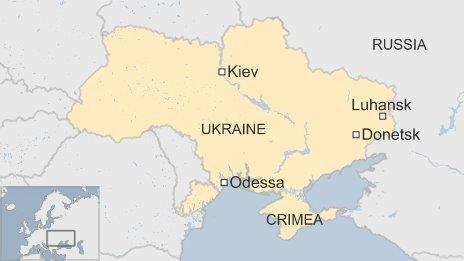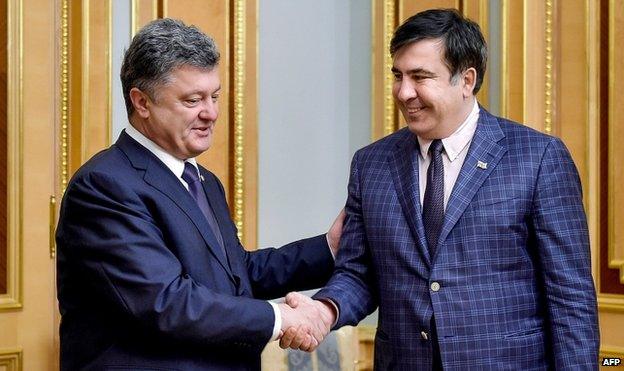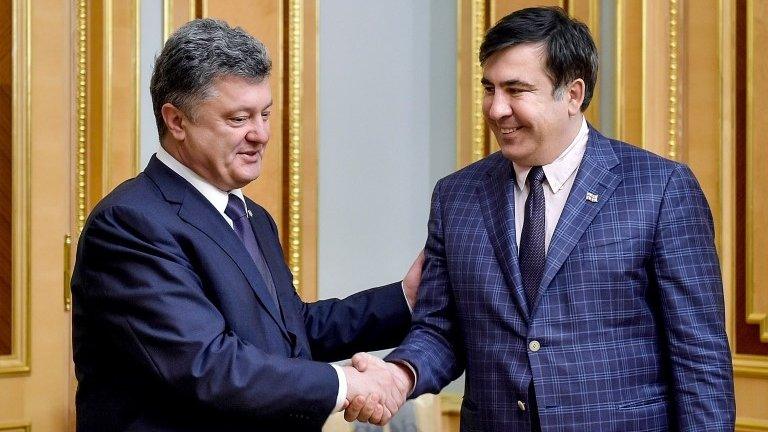Saakashvili Ukraine's new governor in Odessa splits opinion
- Published
When he became governor of Odessa in 2015, Mikheil Saakashvili told the BBC he would fight corruption and criminality
Mikheil Saakashvili, the former Georgian president, is a politician who inspires few neutral emotions.
Discussions over his legacy often descend into two separate camps of those who love "Misha" (as he is commonly referred to) and those who harbour a less-than-generous opinion of him.
The shock announcement on Saturday, that Ukrainian President Petro Poroshenko had appointed him as governor of the southern region of Odessa, elicited a similarly varied response.
Mr Poroshenko's choice of such a divisive, head-strong character was interpreted as a sign of weakness, or a demonstration of strength. A stroke of genius - or a blunder of gargantuan proportions.
Those in the "for" camp tout his numerous and Western-style reforms in the years following Georgia's 2003 Rose Revolution that brought him to power, transforming a country on the verge of complete collapse.
In the "against" camp, many point to his impulsiveness - which may have provided the spark to Georgia's disastrous war with Russia in 2008 - and his heavy-handed methods in dealing with political dissent.
Fragile relationship
Odessa is one of Ukraine's most critical and sensitive regions, one that has been convulsed by extreme political violence in the last year, and which appears to be coming under increasing pressure from pro-Russian separatists.
And the former Georgian leader is also a well-known adversary, to put it lightly, of Russian President Vladimir Putin.



President Poroshenko's relationship with the Russian leader is fragile and often appears about to disintegrate completely, but it nevertheless still exists, and the two men need to keep their their lines of communication open.
The question is whether Mikheil Saakashvili's strident anti-Putinism, now given a very public forum, could disrupt the delicate balance in Ukrainian-Russian affairs.
Both sides' reactions were immediate. Russian Prime Minister Dmitry Medvedev tweeted a message amounting to "the circus continues," in reaction to the Georgian's appointment.
Mr Saakashvili shot back, describing the message as "hysterical."

Mr Poroshenko (left) made the announcement at an event in Odessa, with Mr Saakashvili standing beside him
Most importantly, he has been tasked to reform what some say is Ukraine's most corrupt region, and rein in the extensive influence there of the country's richest men - the so-called "oligarchs".
"He (and whatever team he appoints around him) will have several difficult battles ahead - the most obvious being with the notoriously corrupt customs at Yuzhny, Illichivsk and Odessa ports," said Nikolai Holmov, who writes a blog on Odessa, external.
"By extension, that will also bring him head to head with organised crime and the Odessa mafia, as well as some other nefarious vested interests within the ports," he added.
'Running out of options'
No-one questions Mr Saakashvili's reputation as a reformer. The question is whether he can clean out the high level of graft, given that he is a complete political outsider with no grassroots structure of support to turn to.
"It shows how empty Petro Poroshenko's bench is, how little he trusts Ukrainians, and how he's running out of options," said one Western analyst, who asked not to be identified, because of the sensitivity of the subject.

The militarily important port of Odessa has become notorious for corruption
On the other hand, his lack of political connections - and therefore obligations - could be a strong point.
Brian Mefford, a political analyst who keeps a blog on Ukrainian politics, wrote recently, external that President Poroshenko had killed two birds with one stone with the appointment: he had replaced the previous governor, widely seen as close to Ukrainian billionaire Ihor Kolomoisky, without shifting "the balance of power amongst competing business interests in the region", as a locally-chosen candidate would have done.
"In appointing Saakashvili as Odessa governor, it would appear that Poroshenko has assigned a strong leader to govern a key region under pressure by the Russians," he wrote.
Audacious move
The other looming question, of course, is why Mr Saakashvili, a former world leader, would accept a position as a provincial governor, especially as he had already turned down a more senior post as a Ukrainian deputy prime minister.
Making this even more confusing is the fact that in accepting the Odessa position, he gave up his Georgian citizenship, which was the main reason he originally gave for turning down the other post.
Mr Saakashvili said the situations in Georgia and Odessa were closely connected.
"If Odessa ever falls, God forbid, then Georgia might be wiped out from the map," he told the BBC. "That's so obvious, if you look carefully at the geo-politics of the region."
One thing most seem to agree on is that this was an unquestionably audacious move by President Poroshenko.
Mr Saakashvili himself commended the Ukrainian president's boldness.
"I think the president gets it," he said. "My appointment shows that he is prone to very unusual, very radical decisions that took many people by surprise."
"It's not business as usual, you know," he added.
- Published1 June 2015
